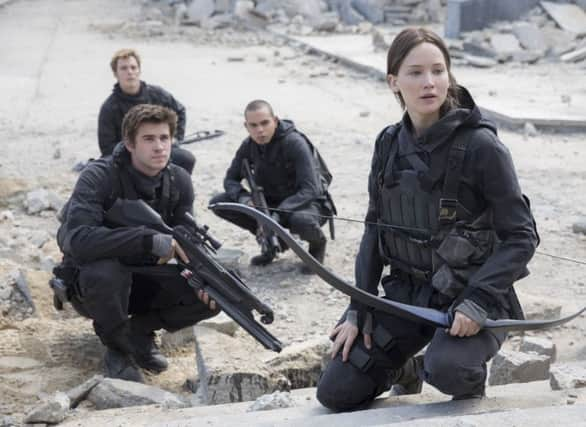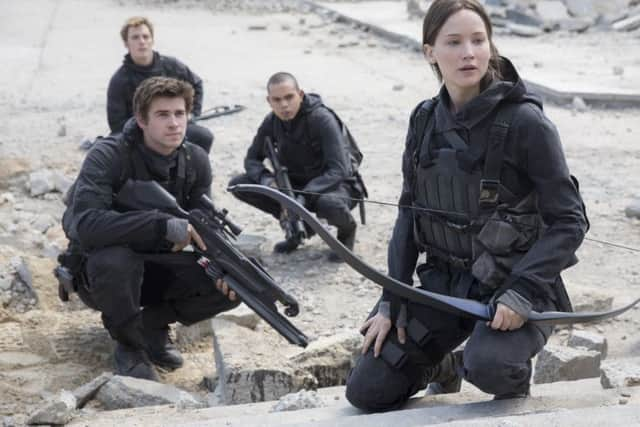Film reviews: The Hunger Games: Mockingjay Part 2 | Love


The Hunger Games: Mockingjay Part 2 (12) | Rating: *** | Directed by Francis Lawrence
Starring Jennifer Lawrence, Josh Hutcherson, Julianne Moore, Philip Seymour Hoffman, Donald Sutherland
Advertisement
Hide AdThe decision to split the final book in Suzanne Collins’ mega-selling The Hunger Games trilogy into two movies seemed like a worthwhile one after the first part of Mockingjay landed in cinemas last year. Following up the brilliant sequel Catching Fire by exploring weighty themes like propaganda, torture and the power games involved in igniting and overthrowing revolutions, it was like a dystopian fantasy riff on Zero Dark Thirty. Too bad, then, that there’s nothing in this follow-up to suggest director Francis Lawrence and screenwriters Peter Craig and Danny Strong (working in collaboration with Collins herself) couldn’t have condensed everything of cinematic worth into one meaty three-hour movie.


Part of the problem of dividing the story in two is the immediate loss of dramatic momentum. Picking up immediately after the previous film’s bleak cliffhanger ending – which has left Katniss Everdeen (Jennifer Lawrence) recovering from an attack by love interest Peeta (Josh Hutcherson) whose mind has been “hijacked” – the film spends much of the first hour restating themes already well communicated by the last film. This wouldn’t be so bad were it not for the fact that the filmmakers simultaneously over-estimate the ability of casual fans to remember intricate details about characters who’ve made only fleeting appearances in the previous movies. Thus we get lots of scenes of Katniss once again wrestling with the morality of war, particularly as the resistance movement with which she’s now thoroughly embedded edges ever closer to storming the Capitol to overthrow President Snow (Donald Sutherland). Yet we also get insignificant moments that muddy the narrative waters and diminish the impact of events that should be inherently dramatic. An early assassination attempt on Katniss, for instance, seems to have no real bearing on the rest of the film, and it soon becomes clear that the two big questions driving the plot – is Katniss just a propaganda tool for resistance leader Alma Coin (Julianne Moore) and will Coin really be any better than Snow? – are not really complex enough to sustain the two-hour running time.
That’s too bad because once things do pick up there are some great moments. Francis Lawrence (who took over The Hunger Games franchise with the second film) has an uncanny ability to ratchet up the intensity of the action in ways that test the limits of the 12A certificate without softening what’s happening in the story. The booby-trapped surroundings of the Capitol, for instance, once again bring to prominence the sadistic arena death match premise Suzanne Collins began this saga with as Katniss and her fellow soldiers find themselves contending with explosive pods, automated machine gun turrets and spring-loaded torture devices. Added to which the film once again refuses to shy away from the consequences of war. The deaths of innocent people and the way these things weigh heavily (or not) on the consciences of those involved adds much-needed depth, ensuring these set-pieces aren’t just examples of mindless spectacle. Indeed it would have been ironic if they had just been mindless spectacle given the story is largely concerned with showing the way in which such things are used to advance political and ideological causes in times of conflict.
But again, this is all stuff that could have been telescoped into one movie. Though the saga remains the best acted of all the recent fantasy franchises – The Lord of the Rings and The Hobbit films, the Harry Potter saga, those abysmal Hunger Games knock-offs Divergent and The Maze Runner – the extra space afforded the actors doesn’t really add much. Of course, any excuse to see Philip Seymour Hoffman on screen with the likes of Julianne Moore or Lawrence is a bonus (this really is his final movie), but his untimely death early last year may also have impacted the finalé more than expected. With the rest of the cast, despite a few moments of playful self-awareness (there are cracks about the “tacky romantic drama” between Katniss, Peeta and Liam Hemsworth’s Gale, and Katniss herself acknowledges the tedium of her burden at one point), we also get a lot of wheel spinning. The actors may ground their characters with real emotions that offset the film’s more fanciful elements, but none of them undergoes much of a progression in this film, at least not enough to justify the extra time. And on the subject of extra time, the ending, while faithful to the book, feels unnecessary to the film – its Return of the King-style unwillingness to let go undermining just how remarkable Katniss is as a character.
Still, Lawrence (Jennifer not Francis) has pulled off something special over the course of these films. Transformed from a relative unknown to a Hollywood-conquering Oscar-winner, she’s given them continued credibility and done that tricky thing of bringing an already beloved literary character to life in a way that will make it impossible for future generations of readers to picture anyone else as Katniss. n
Steve McQueen: The Man & Le Mans | Rating: **
Directed by Gabriel Clarke, John McKenna
Sometimes the stories behind movies can be more interesting than the movies themselves, particularly when those films end up being artistic follies in which unchecked egos get in the way of making something genuinely great. Unfortunately that’s not the case with the new documentary Steve McQueen: The Man & Le Mans. Revolving around the tortuous production of Le Mans, McQueen’s troubled 1971 movie about the famous 24-hour French motor racing event, Gabriel Clarke and John McKenna’s film trawls the archives and secures plenty of talking-head interviews, but it never makes a compelling case for why we should care.
Advertisement
Hide AdProducing the film under the aegis of his own company, McQueen wanted to use his power to indulge his noted petrol-head proclivities. On screen he’d already done The Great Escape and Bullitt; off screen he was a fearless driver, good enough at any rate to compete professionally in the 12-hour Sebring race in 1970 (and come in second, despite suffering from a broken foot). It seemed only natural, then, that at the height of his box office powers he’d embark on a passion project like Le Mans, which he was determined to shoot in as authentic a way as possible by filming it documentary-style during the actual event (motorsports aficionados are the only people who really rate the film for this reason).
His instincts for doing it this way were certainly correct given the way filmmaking was headed as the New Hollywood brats started taking inspiration from the French New Wave and began making looser, more realistic movies like Easy Rider. McQueen, though, was very much rooted in the old star system and didn’t really have the acting chops to pull off the sort of semi-improvisatory, in-the-moment style that would match the realism of the driving scenes. As such he never locked down a decent script and the end result was a film with some dynamic action and lots of leaden drama, a movie that looked hopelessly stilted when compared to, say, the dynamism of The French Connection, which came out the same year.
Advertisement
Hide AdThe thing is, none of this kind of context is in the documentary. It treats the making of the film as something special in and of itself, when it wasn’t. Afterwards McQueen went back to making Hollywood vehicles like The Towering Inferno and the world shrugged and moved on. The possibility that the cancer that killed him may have been caused by the asbestos contained in his racing suits is mooted at the end of the film as a revelatory fact, when really it’s really just a tragic irony. It certainly doesn’t elevate this above a standard making-of documentary.
Love (3D) (18) | Rating: * | Directed by Gasper Noé
Starring Karl Glusman, Aomi Muyock, Klara Kristin
“I want to make movies out of blood, sperm and tears,” says the unbearably pretentious wannabe director at the heart of Gasper Noé’s latest faux controversial indulgence. “This,” he goes on, “is the essence of life.” It’s also the essence of bad cinema. Following a long line of art house filmmakers who in the years since Last Tango in Paris have deluded themselves into believing they’re re-inventing the wheel by making explicit movies about sex – take your pick from Catherine Breillat (Romance), Patrice Chéreau (Intimacy), Lars von Trier (Nymphomaniac Vol I and II) or Sam Taylor-Johnson (50 Shades of Grey) – Noé has managed to top them all by making perhaps the most tedious, baby-brained, pseudo-intellectual piece of nonsense likely to grace a cinema screen this year. The fact that he’s designed this as a 3D “experience” – replete with money shots aimed at the audience and an impressionistic vaginal-view of penetrative sex – doesn’t in any way make it interesting. In fact it just adds to the overall boredom of being subjected to a 52-year-old filmmaker’s adolescent musings on male and female sexuality.
Surpassing even the emptiness of his own accurately titled previous folly Enter the Void, Love has nothing to offer on its titular subject beyond eminently slappable characters regurgitating the same old points uttered in every other movie about the relationship between love and sex. And those characters really
are unbearable, starting with Noé cipher Murphy (Karl Glusman), whose droning interior monologue
is like having a knitting needle pushed slowly through your ear. When he’s not whining to himself about how everything in his life has gone wrong, he’s obsessing over his old girlfriend Electra (Aomi Muyock). She’s the love of his life, even though he repeatedly cheated on her and got their neighbour – with whom they had threesomes – pregnant by mistake.
As the film opens he’s living with his son and the boy’s mother. When the news reaches him on New Year’s Day that Electra has disappeared and may even have committed suicide, he embarks on a downward spiral of introspection and regret, flashing back in his mind to pore over the detritus of their relationship while simultaneously trying to track Electra down. As the film jumps back and forth in time we see how tempestuous their supposedly boundary pushing relationship was. Sex clubs, hook-ups with strangers and sessions with transsexual prostitutes all figure prominently. The acting, though, doesn’t come close to being competent enough to convey everything the characters are supposedly going through. Glusman has zero charisma and Muyock mistakes screaming at the top of her lungs for emotional engagement. But the fault isn’t with the non-professionals Noé has corralled into starring in the film. Noé himself has no original ideas and seems to think soundtracking explicit sex with the Goldberg Variations and Gnossienne No 3 is the height of sophistication. Gone is the formal brilliance, great acting and dramatic forcefulness of Irreversible; in its place is a filmmaker indulging in a spot of cinematic onanism